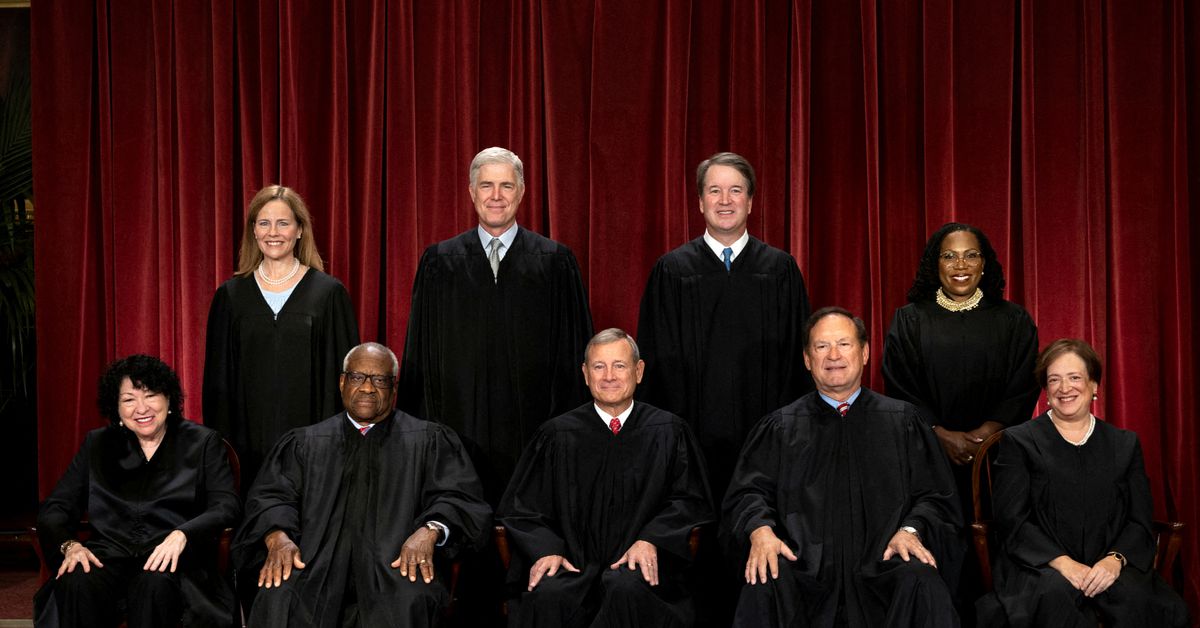- cross-posted to:
- [email protected]
- politics
- cross-posted to:
- [email protected]
- politics
WASHINGTON, July 19 (Reuters) - Senate Democrats are pursuing legislation this week that would set a binding ethics code for the U.S. Supreme Court following revelations that some conservative justices have failed to disclose luxury trips and real estate transactions - a measure facing an uphill battle thanks to Republican opposition.
Senate Judiciary Committee members on Thursday are set to debate and vote on a bill introduced by Democratic Senator Sheldon Whitehouse that would impose on the top U.S. judicial body new requirements for financial disclosures and for recusal from cases in which a justice may have a conflict of interest.
Unlike other members of the federal judiciary, the Supreme Court’s nine life-tenured justices have no binding ethics code of conduct. They are subject, as many high-level federal officials are, to disclosure laws requiring them to report outside income and certain gifts, though food and other “personal hospitality” such as lodging at an individual’s residence is generally exempted.
Justices also decide for themselves whether to step aside from cases involving a possible conflict of interest.
Democratic lawmakers have said that news reports in recent months detailing ties between wealthy benefactors and some conservative justices show the court cannot be trusted to police itself.
“To hold these nine justices to the same standard as every other federal judge is not a radical or partisan notion,” Whitehouse and the committee’s Democratic chairman Senator Dick Durbin said last week in a joint statement.
The legislation, even if it manages to gain committee approval, would face long odds to win passage on the Senate floor, where it would need some Republican support to advance. And it appears to have little chance to get through the Republican-led House of Representatives.
The news outlet ProPublica has detailed ties spanning decades between conservative Justice Clarence Thomas and billionaire Republican donor Harlan Crow, including real estate purchases and luxury travel paid for by the Dallas businessman. ProPublica also has reported that conservative Justice Samuel Alito failed to disclose a private flight to Alaska provided by a billionaire hedge fund manager whose business interests have come before the court as the justice took a luxury fishing trip.
Separately, the news outlet Politico has reported that conservative Justice Neil Gorsuch failed to disclose that the buyer of a Colorado property in which he had a stake was the chief executive of a major law firm whose attorneys have been involved in various Supreme Court cases.
The court’s public approval cleaves along partisan lines as its 6-3 conservative majority continues to steer the law in a rightward direction, with 44% of respondents - including 28% of Democrats and 72% of Republicans - expressing a favorable view of it in a Reuters/Ipsos poll conducted in June.
Some Judiciary Committee Republicans have sought to portray the ethics reform push as an effort by liberals and Democrats to smear the court, and have argued that it should set its own rules.
“The Supreme Court does a good job of that on their own,” Republican Senator Mike Lee of Utah, who sits on the Senate Judiciary Committee, told Reuters, referring to ethics rules. “My general inclination is to let them do it.”
Senator John Kennedy, another Republican panel member, questioned whether lawmakers possess the power to impose ethics standards on the court.
“I’m not sure that Congress has the authority to do it under the separation of powers,” Kennedy told reporters, referring to the U.S. Constitution’s division of powers among the U.S. government’s executive, legislative and judicial branches.
The Judiciary Committee held a hearing on Supreme Court ethics concerns in May, but conservative Chief Justice John Roberts rebuffed Durbin’s invitation to testify, citing “the importance of preserving judicial independence.”
Roberts has said the justices, in assessing their own ethics obligations, consult a code of conduct adopted by the policymaking body for the broader federal judiciary. That code, binding to lower federal court judges but not the justices, requires judges to avoid even the “appearance of impropriety.”
Whitehouse’s legislation would require the justices to adopt a code of conduct as well as create a mechanism to investigate alleged violations. Whitehouse has accused the justices of reading current ethics rules “in unique and eccentric ways.”
“And when they’re caught out of bounds,” Whitehouse said at the May hearing, “they refuse to allow any investigation of the facts.”



Based on previous experience, checks and balances is not a thing for the Supreme Court. The most powerful people in the country and they aren’t even elected.